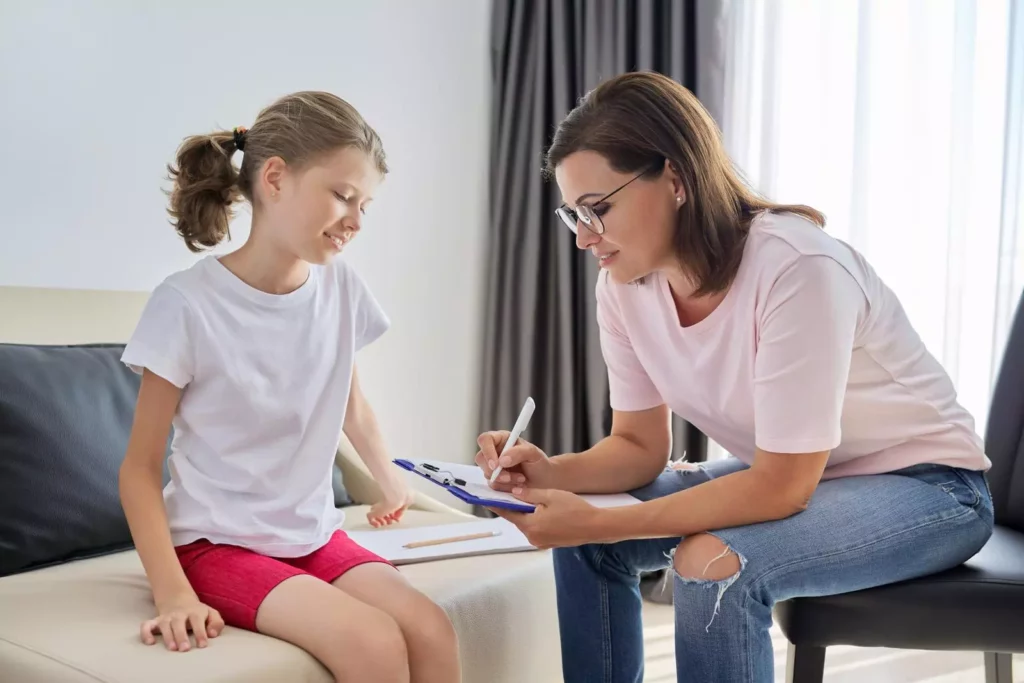Adolescent & children psychotherapy
Child and adolescent psychotherapists are licensed health professionals with specialized expertise in dealing with children, youth, and their families. They are skilled in child development, disorders, and emotional and psychological disruptions that affect young people. Our therapists will help you and your family achieve your goals by addressing the child’s difficulties. A psychodynamic-oriented approach to assessment and treatment is where the therapist explores the inner thoughts, feelings, and perceptions of the child, as well as how they view and interact with their surroundings.
This is the centered approach to children’s psychotherapy. Patterns that hinder healthy development are found through attentive observation and clear, respectful communication with the youngster. A child or family will engage in therapeutic dialogue and exchanges with a therapist to help with problem-solving, behavior modification, and life-changing improvements.

Psychotherapy for children & adolescents process steps
Step 1
After the assessment and diagnosis, the next step is treatment. Psychotherapy for children is when the therapist aims to establish a rapport with the young patient. The therapist sympathizes with the child to get them interested and engaged in exploring their problems. The therapist uses persuasive communication strategies. In this initial disclosure stage, effective communication skills are essential. This is crucial because it shapes how the young patient views the therapist and how much they will trust them. Therapists who are experienced and compassionate are able to reach young people and get them to open up and form a connection. Some youngsters can be quite resistant to treatment, so this relationship-building stage is crucial.
Step 2
The next step with psychotherapy for children is the most complex and includes the therapist searching for patterns, gathering new information and then connecting the dots with the patient’s mental health issue. Each aspect varies according to the kind of problem and the type of patient but, in the initial stages of this phase, it is important for the patient to experience awareness about their problem. Behavioral manifestations do not occur just in any way, but rather they follow idiosyncratic patterns that are characterized by their excessive rigidity, and by the fact that they are unsuitably repetitive, and are harmful to the patient. These patterns include looking for triggers, vicious cycles, and negative interactions.
Step 3
The goal-setting stage is where the child and therapist develop specific ways to solve problems that are impeding the achievement of the treatment goals. The accomplishment of short- and long-term goals is critical with psychotherapy for children. This last but important step of treatment is where the therapist and patient can acknowledge and realize progress made throughout therapeutic sessions such as definitively resolving regressive kinds of reliance and accepting accountability while realizing their strengths. Some young people prefer to continue with psychotherapy long-term to improve their mental health and become better versions of themselves. Therapy may continue and be less intense but rather used as a preventative measure to ongoing care.

The benefits of psychotherapy for adolescents and children
By helping young people understand themselves and how they relate to others, psychotherapy for adolescents can identify and treat mental health issues. There are benefits not only for the child but also for the entire family. Emotions can be intense during childhood and adolescence, and any change to a child’s routine or family life can have a significant effect on their mental health. These are crucial developmental years and childhood self-esteem issues and lack of confidence can have a harmful effect and persist into adulthood. The Good Health team of psychotherapists have specialist knowledge and experience working with children and adolescents who have different issues that are very age specific. Our psychotherapists collaborate closely with parents with the goal of improving the child’s mood, self-esteem, and confidence while teaching them to manage stressful situations.
FAQs
Who attends the first meeting with the children's psychotherapist?
With adolescent psychotherapy, the therapist will first meet with you and your child for a conversation to learn more about your child and the issue. Your therapist will then be able to explain how they can assist.
How do I find a child and adolescent psychotherapist?
Finding a child therapist need not be challenging. An endorsement from a person you know, and trust makes many people feel more at ease. Consult with friends, family, or your primary care physician for suggestions on professionals who specialize in adolescent psychotherapy.
When do I need to bring my child to a psychotherapist?
The sooner children receive treatment for emotional or behavioral issues, the simpler it will be to assist them. If your child is behaving in a troubling way that lasts longer than a few weeks, then you may need to consider help.
How do I explain therapy to my kid?
Every child knows what a doctor is, so describe therapy to your children as going to see a ‘feelings doctors. Inform them that a therapist will enable them to discuss their feelings of sadness or rage and refer to a recent example where they were distressed and explain that the therapist can assist them in situations like that.
How to ensure children's psychotherapy is safe for my kid?
Find a reputable specialist in adolescent psychotherapy. Psychotherapy often involves little risk. However, because therapy might examine upsetting emotions and events, your child could occasionally feel emotionally uncomfortable. A qualified therapist will help your child work through moments that are painful.
Will the therapist tell me what my child/adolescent talks about in the sessions?
Although the right to privacy in therapy for minors is restricted, some therapists request parental agreement to privacy before treatment. Young patients need to be able to reveal their ideas, feelings, experiences, and behaviors in therapy without worrying about being judged. Additionally, they must have faith that their therapist won’t reveal this knowledge to their parents.
Don't hesitate to contact us
Have any questions?
Please complete the form below and we will get right back to you.